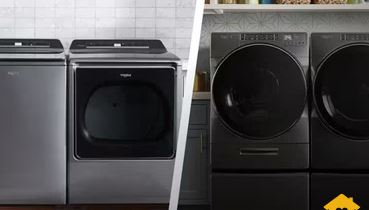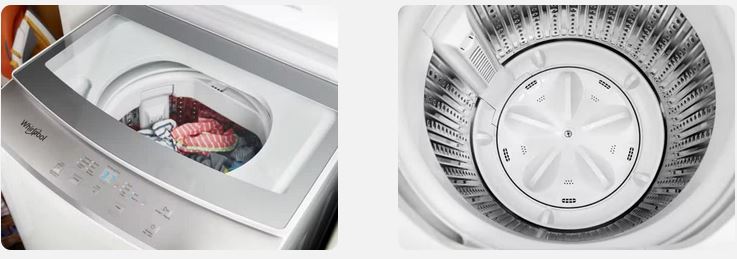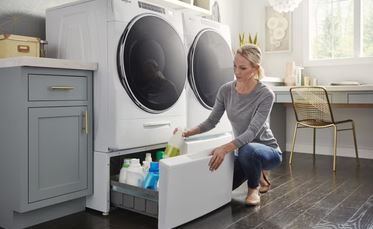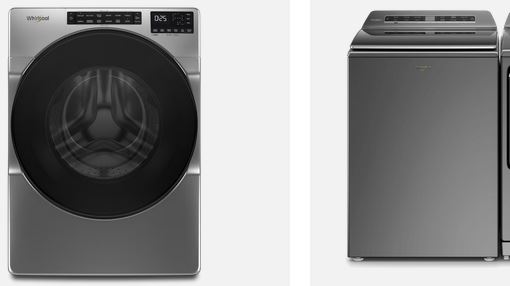A lot goes into comparing top load vs front load washers pros cons, and among them are initial cost, efficiency, capacity, speed and cycle length, ease of loading and offloading, accessibility, mold susceptibility, maintenance, space economy, mid-cycle addition, and effect on cloth.
Overall, front loaders are more spacious, efficient, wheelchair accessible, better cleaners, space economical, and gentle on fabric. On the other hand, top loaders are more affordable, faster, and easy to load/offload, maintain, and add items mid-cycle.
This review will pit the two washer types against each other to help you identify their merits and demerits and choose which suits you more. Ultimately, I’ll give my verdict based on 12 factors that will form the basis of the comparison.
So, let’s dive in!

In a rush? Below is an overview of the pros and cons of top-load and front-load washers:
A Summary of the Pros and Cons of Top Load Vs Front Load Washers
| Front Loaders | Top Loaders | ||
| Advantages of Front Loaders | Disadvantages Of Front Loading Washing Machine | Advantages of Top Loaders | Disadvantages of Top Loaders |
| More spacious, more efficient, wheelchair accessible, better cleaners, space-economical, and gentle on fabric | Costlier, slightly slower, mold-susceptible, high maintenance, and doesn’t allow mid-cycle additions | More affordable, faster, easy loading and offloading, less maintenance, and allow mid-cycle additions | They are less efficient, less wheelchair-accessible, not stackable, less effective cleaners, and can damage the fabric |
12 Top Load Vs Front Load Washers Pros Cons Comparisons
Top-load and front-load washers differ in many ways, and that’s where we get their pros and cons. Here are some of the key ways you can differentiate them and decide between them:
1. Initial Cost
Typically, a decent top-load washing machine averages $500-$800, depending on the brand, capacity, and features. You, however, have to spend more than $800 to get a decent front-load washer from a reliable brand, and some cost as much as $1500-$2,000, which is quite expensive.
Verdict: Top-load washers win the battle as they are more affordable than front-loaders.
2. Washer Efficiency
According to the Energy Star website, Energy-Star-rated front loader washers use 25-45% less energy than top-load options. Of course, top-loaders featuring an agitator are more fuel-efficient than their impellor counterparts.
Regarding water usage, Energy Star argues that front-load washers save up to 50% of energy. In essence, they use half as much as top-loaders and thus are likely to save you on utility bills in the long run.
Verdict: Front-load washers win the battle as they are more water and energy-efficient
3. Top Load Vs Front Load Capacity
Top-load washers either feature an impeller or agitator at the center, which takes up much space. For that reason, they mostly have a smaller drum space, so you cannot load many clothes.
Of course, there are some exceptions with enormous capacities. But as far as the same physical size goes, front-loaders are likely to have more tub space than top-loaders
Verdict: Front-loaders win the battle as they are more spacious than top-loaders

4. Speed and Cycle Length
Top-loaders generally have a higher spin rate. They spin the clothes faster and remove water from the clothes at an equally fast rate. Ultimately, that translates to a quicker, shorter wash cycle and less drying time.
Conversely, front-loaders gently spin the clothes to wash them, and that takes longer, translating to not an extended wash cycle. Note, however, that the overall wash cycle length depends on not only the washing machine’s spin speed but also the model, load size, and cycle selection.
Verdict: Top-loaders win the battle as they are faster than front-loaders
5. Ease of Loading and Offloading
As far as loading a washing machine goes, you’ll likely have an easier time loading and offloading a top loader than a front loader if you are medium height or taller. The only issue is that you may struggle to do it from a wheelchair or if you are of short stature.
If you are taller and want to use a front loader, you may need a pedestal to raise its height.
Verdict: Top loaders win the battle here, except for shorter people and those in wheelchairs who will find front loaders more accessible.
6. Cleaning Effectiveness
Front-loaders clean cloth by tumbling action. Tumbling creates enough friction between the clothes to enable them to rub against each other, delivering brilliant results. That essentially makes front loaders effective cleaners.
Top loaders, on the other hand, either use an impeller (which is disc-like) or an agitator) which is spindle-like) to turn the clothes and rub against each other, and in doing so, some of the items go out of position. That means the clothes may not be as clean as you would love.
Verdict: Front-loaders win the battle as they are better cleaners than top-loaders
7. Top Load Vs. Front Load Washer Accessibility
Top loaders typically come at waist length, making it easy for most people to use them. The only issue is that they are not wheelchair accessible.
Meanwhile, front loaders are wheelchair accessible. However, if you are tall, you may have to bend a lot, which could be inexpensive, or invest in a pedestal, which is another cost.
Verdict: Top-loaders are more accessible to most people. However, if one is looking for a wheelchair-accessible option, that must be a front-loader.
8. Mold Susceptibility
Both front-load washers and top-load washers can get mold. Top loaders smell like mildew or become moldy when water is trapped in the drum for a long time due to poor cleaning. Front-loaders also can get mold when water is trapped, but this often happens around the gasket and other hidden spots, which are far more challenging to reach when cleaning.
Verdict: Top-loaders win the battle slightly as they are slightly less susceptible to mold

9. Top Load Vs Front Load Washer Maintenance
Top loaders are generally easy to clean as fewer hidden and inaccessible spots exist. What’s more, they are easier to troubleshoot DIY than front loaders. Front-loaders often require an expert’s help to fix them and are not as easy to clean as top loaders.
Verdict: Top-loaders win the battle as they require less maintenance than front-loaders
10. Space Economy
Unlike top loaders, most front loaders are stackable, which makes them more apartment-friendly. Their design is also not bulky, occupying less space than their front-load counterparts. You’ll, however, need more space to set up a top loader, and since you can stack it, you also have to factor in the space for the dryer.
Verdict: Front-loaders win the battle as they are stackable
11. Mid-Cycle Addition
Front loaders have a tight lock mechanism that doesn’t allow you to open the door mid-cycle and add items. In contrast, top loaders let you open the lid mid-cycle and add a few items. It’s, however, not advisable to do that as you interrupt an ongoing cycle, which could affect the overall cycle length.
Verdict: Top-loaders win the battle as they allow mid-cycle interruption
12. Effect on Cloth
Due to the tumbling action of the clothes, front loaders are pretty gentle on the fabric. That’s unlike top-loaders whose impeller or agitator can rub against the fabric and damage it. Top loaders are just not gentle to cloth.
Verdict: Front-loaders win the battle as they are more gentle on fabric
Is It Better to Have a Top or Front Load Washer?
Both top-load and front-load washers have their fair share of good and bad. On one hand, top loaders are easily accessible by taller people, easier to maintain, cheaper, and faster. They are generally ideal for most people, except those in wheelchairs and for shorter individuals.
Their downside is that you can stack them, which means you need more space to fit them, and they are not as effective cleaners as front loaders. Furthermore, they use more water and energy than front loaders, which should be a concern.
Meanwhile, front loaders are water and energy-efficient and effective cleaners. They are also wheelchair accessible and perfect for shorter guys. If you are tall, you may have to invest in a pedestal. Moreover, front loaders are more spacious and stackable, making them perfect for tighter spaces.
The issue is that they are costly, not as fast as top loaders, and require a higher level of maintenance, especially regarding mold control.

People Also Ask
1. Which Is the Best Top-Loading or Front-Loading Washing Machine?
You can tell the best top-loading or front-loading washing machine from factors like ease of access, water and energy efficiency, cycle length and speed, effect on cloth, cleaning effectiveness, capacity, and maintenance.
In that case, the best top-loading or front-loading washer should be easy to access, water and energy-saving, faster, less damaging to clothes, effective in cleaning, spacious, and easy to maintain.
Some reputable brands you can count on for the best top-loading and front-loading washing machines include Maytag, Whirlpool, Samsung, LG, Electrolux, GE, Hisense, Amana, AEG, Bosch, Black + Decker, Hotpoint, Miele, Frigidaire, to name a few.
2. What Lasts Longer Top-Load or Front-Load Washer?
Any well-maintained washer, be it a top or a front loader, can last 10-14 years. It’s not about the type of washer but the level of maintenance. The more you maintain the washer, the likelier it is to serve you longer. But again, the brand type has a say, as some washer brands are more reliable than others and are thus likely to last longer.
3. Are Top Load Washers More Reliable Than Front Load?
The issue of washer reliability depends on the level of maintenance, washer brand, and usage level, among others. The more you clean and look after the washer and use it properly, the more reliable it’s likely to be. So, arguing that one washer type is more reliable than the other can’t be justice.
Concluding Thought On Top Load Vs Front Load Washers Pros Cons:
As we’ve shared, you can’t go wrong with a top or front loader if you shop right. Budget-wise, top loaders are more affordable, easily accessible by taller guys, easy to maintain, and faster.
On the other hand, front loaders may be costly but are the most wheelchair accessible, better cleaners, water and energy efficient, and spacious. Thus, consider all that when deciding which of the two washers you should go for.
